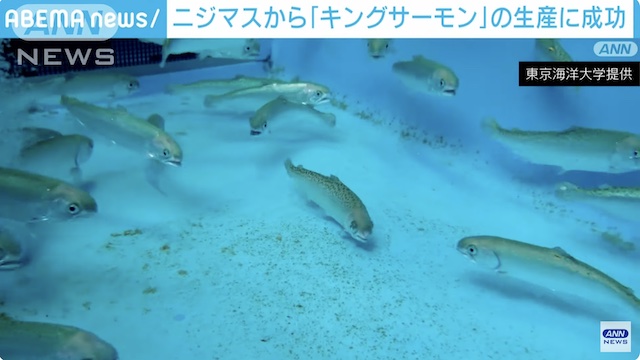TOKYO, May 25 (News On Japan) - A research group at Tokyo University of Marine Science and Technology has successfully produced King Salmon using Rainbow Trout, which can spawn multiple times unlike King Salmon that die after spawning once.

This achievement is significant for both the efficiency of aquaculture and the preservation of the King Salmon species, which is at risk of extinction on the west coast of the United States.
King Salmon, Sockeye Salmon, and Rainbow Trout all belong to the genus Oncorhynchus. These salmon species typically hatch in rivers, migrate to the Pacific Ocean for three to four years, and then return to their birth rivers to spawn. After spawning, King Salmon and Sockeye Salmon die shortly thereafter. However, Rainbow Trout, despite being in the same genus, can reproduce every year without dying after spawning.
Professor Goro Yoshizaki and his team focused on this difference and examined the germ cells responsible for eggs and sperm in these salmon during their spawning period. They found that in King Salmon and other salmon that die after spawning, the germ cells completely disappear during the spawning period, whereas in Rainbow Trout, the germ cells remain even after spawning.
By transplanting the germ cells of King Salmon into Rainbow Trout that were modified to be unable to produce their own eggs or sperm, the researchers were able to have the Rainbow Trout produce King Salmon eggs for three years and sperm for four years.
Further experiments with breeding these germ cell-transplanted Rainbow Trout resulted in offspring that hatched at almost the same time as King Salmon and grew into salmon with DNA nearly identical to that of King Salmon.
The results of this research are expected to significantly improve the efficiency of aquaculture for King Salmon, a species with high commercial value but which takes a long time to mature and dies after spawning once.
Additionally, with King Salmon facing extinction on the west coast of the United States, combining this research with long-term cell preservation techniques could potentially enable the restoration of individual fish from preserved cells.
Professor Yoshizaki stated, "This technology is important not only for improving aquaculture efficiency but also for preserving species. We hope to accelerate the analysis of why King Salmon and similar species die after spawning once."
The research has been published in an open-access journal founded by the publisher of "Science."
Source: ANN















